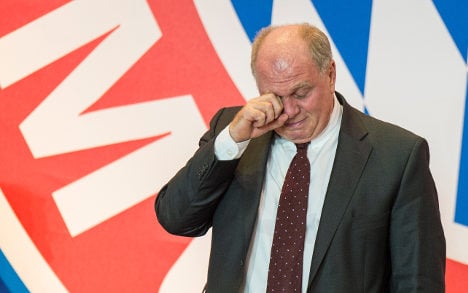Depending on the outcome, the trial over tax evasion could turn out to be a major test for the club and its much-loved leader.
"The large majority of the fans will support him whatever happens at the trial," Bernd Hofmann, president of the FC Bayern Fanclub Nabburg of which Hoeneß is an honorary member, told The Local.
The four-day trial begins more than a year after the football legend admitted to authorities he had hidden millions of euros from the tax man in a secret Swiss bank account.
"Everyone makes mistakes and he's admitted all of his. I'm convinced he won't have to go to jail," added Hofmann. "The things he did were wrong and he's said so but that doesn't make him a bad person."
Hoeneß's legal team will rely on a clause in German tax law which says that if tax evaders turn themselves in before they are caught, they can avoid prosecution or receive reduced punishment.
But authorities rejected Hoeneß's Selbstanzeige (voluntary declaration) in January last year saying it was incomplete.
They handed over the case to the state prosecutor to investigate.
In March, prosecutors searched Hoeneß's house and arrested him on suspicion of tax evasion. He paid €5 million in bail and was released.
None of this was made public until April 2013, when Focus magazine revealed his identity.
Since then, speculation about Hoeneß's finances has been rife, very little of which has been confirmed outside of individual press reports. All eyes will therefore be fixed carefully on the proceedings.
Key questions need answering
Since Hoeneß has admitted tax evasion – also in frequent press interviews – the question is what kind of punishment he should face.
Judges at the trial are expected to weigh up two key questions. Firstly, was his voluntary declaration legally correct and complete or was there more money spirited away somewhere?
Secondly, how much exactly did he fail to declare and how much tax did he avoid paying?
Also in question is Hoeneß's motivation in turning himself in. Prosecutors suspect the Bayern boss acted out of fear of getting caught – rather than regret – after he was spooked by rumours a journalist was looking into his financial affairs.
Information could also come to light during the trial about the initial leak from the tax authorities to press. In January last year, three days before Hoeneß confessed, Stern magazine reported it had found a secret Swiss account containing huge sums of money in the name of an important person in German football – but did not say who.
Jail or fine?
Judges weighing up these factors will decide whether Hoeneß goes to jail or gets off with a hefty fine. In the worst outcome for Hoeneß and his club, he could face an immediate prison term of up to five years, thereby risking losing his position as Bayern chief.
The sheer size of the sums involved could act against him, as a 2012 ruling by Germany's highest court says large-scale tax evaders caught failing to declare assets amounting to a tax bill over €1 million should go to jail.
And according to a document seen by the Süddeutsche Zeitung, prosecutors believe Hoeneß's secret Swiss account meant he avoided paying €3.5 million in tax on a fortune thought to be "far in excess of €30 million."
Trial by media
The trial outcome is expected to be a close call. Acting in Hoeneß's favour will be his honesty and openness over the past year.
Hoeneß has talked candidly about how between 2001 and 2006 he was addicted to “gambling” on the stock market and had set up the account to hide his winnings.
An important detail for any future legal implications for the club FC Bayern could be the money Hoeneß said he borrowed from his friend and Adidas chief Robert Louis-Dreyfus in 2000.
Louis-Dreyfus, who died in 2009, had very close ties to the club and Adidas has poured sponsorship money into it for decades. This could prove problematic for FC Bayern, which has always attempted to draw a clear line between Hoeneß's illegal activities and the club finances.
Loyalty to a legend
Despite outpourings of support from club leaders, sponsors and fans, the outcome of the trial could still see Hoeneß lose his position as club chairman.
Amid mounting pressure last May, Hoeneß offered his resignation to FC Bayern’s supervisory board. But his club remained staunchly loyal and rejected his offer to step down over the affair.
In November, the club released a statement saying it had confirmed it was legal for Hoeneß to remain in his position while under investigation.
Emotional scenes followed at the club's annual general meeting, when thousands of fans gave Hoeneß a minutes-long standing ovation, causing him to burst into tears.
Given the level of support, it seems little short of an extended jail sentence could potentially shake Hoeneß from his seat.
Of course, said Hofmann, there were those people who hate Bayern because the club was so successful. "Since they can't beat Bayern in sport they are trying to get rid of Mr Hoeneß in other ways," he claimed.


 Please whitelist us to continue reading.
Please whitelist us to continue reading.
Member comments